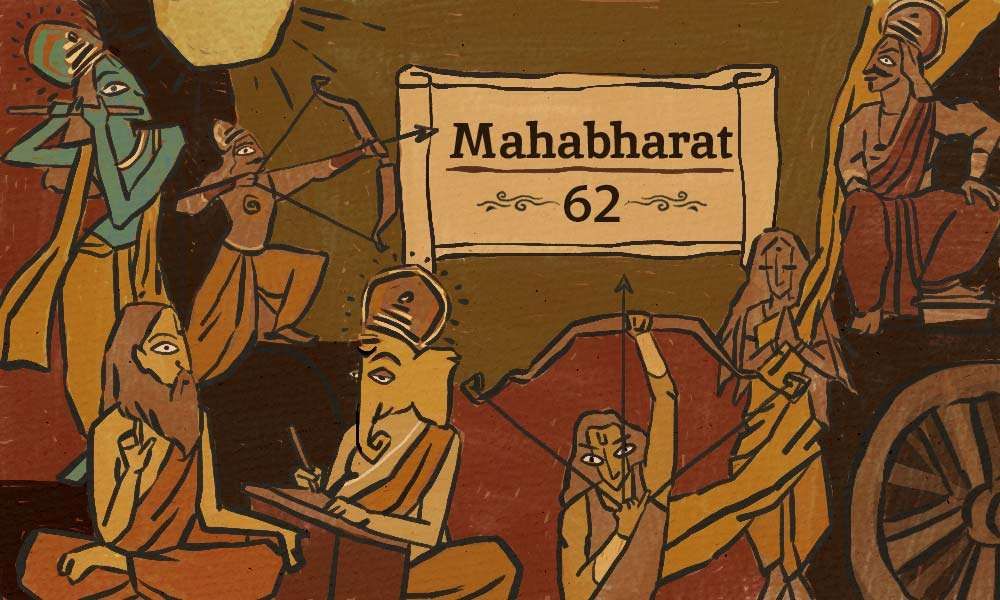Mahabharat Episode 62: Bhishma on the Bed of Arrows
In his last moments, Bhishma gives Yudhishthira some guidance on what it takes to be a king, and receives the greatest gift in his life.

If you do something brave which does not produce any results and you get killed, that is called being stupid – not brave. If your action is such that you do not care whether you live or not, but you take a situation beyond a certain point, then you could call that bravery. But in a state of reaction, you will see that even a puny little dog on the street, if you really corner him, he will suddenly act brave. Before you die, you give one last burst of something, which may or may not produce results. That is not real bravery, that is just trying to fight off death. If you are fearless, that is different. Bravery means you may have fear in your heart, but you never let it go out of control.
Subscribe
Yudhishthira and his four brothers went to see Bhishma at the very end of his life. Bhishma was lying on the battlefield, all pierced by arrows. Since he had the power to choose the time of his death, he decided that he wanted to die during uttarayana, which is considered to be a good time to die. The war had ended in the second week of December, just before the solstice, so Bhishma hung on. He chose to leave his body on what is now called Bhishmashtami. On that day, before he was to leave his body, the Pandavas gathered around him.
Since Yudhishthira now had the kingdom for himself, he sought advice from Bhishma because he wanted to do his best as the new king. But Bhishma was in pain, so he looked at Krishna and said, “There is only one wish inside of me. Krishna, please fulfill it for me. I want to see your real form! I want to see you in your full glory.” So Krishna touched Bhishma’s body and relieved him of all the pain, so that he could speak to Yudhishthira. Then he showed his full Vishwarupa Darshana – to Bhishma alone, experientially, while the others stood by. Bhishma said, “All my life, no matter what pain or struggles I have gone through, or however long I have waited in this pain, I could see you, and that is all. This one vision that I have of you is enough for me.” And he became willing to advise Yudhishthira on whatever he wanted.
Yudhishthira asked a hundred questions which developed into a very elaborate discourse with Bhishma. He asked, “What is the dharma for a king?” Bhishma said, “A king’s first dharma is to worship the gods and to honor brahmanas, who are illuminated men.” “Illuminated men” did not mean someone who is born in a certain family; that was not the idea of brahmana in those days. Your brahmanahood had to be achieved, not by birth. Bhishma continued, “He must conceal his weaknesses. He must know his enemies’ weaknesses and exploit them. A good king must be compassionate but never weak. He must not share his innermost thoughts with anyone, not even his closest advisors.”
“The essence of a king’s dharma is to secure his subjects’ prosperity and happiness. He must be a master at creating discord in his enemy’s kingdom. He must know how to employ spies and sow dissension among those who serve his enemy. The treasury must always be full, because the king’s power stems from his wealth. A king must have an army to defend his kingdom and his people. His spies must be the hardiest, most incorruptible men, strong and able to bear long privations, exile, cold, heat, violence, and hunger.”
“A king has to rule, not only with dharma but with adharma too. The king, on whom his people rely, must never hesitate to be ruthless with his enemies. He must blend trust with mistrust judiciously. He should use one minister to spy upon another. A good king levies taxes as a bee gathers pollen from flowers – gently without injuring his people. But of all those who are close to him, a king should fear his own blood like death. As a kinsman always considers himself to be the king’s equal or his superior, he is more envious than anyone else.”
It is a very long discourse; this is just to give you an insight into Bhishma’s mind. His mind was about doing whatever was needed for the wellbeing of his nation. He was a patriot without any other concerns. That is how he lived all his life; that was the advice he passed on to Yudhishthira. And for Yudhishthira to remain a successful king for thirty-six years, he must have used every advice and even invented a few more.
To be continued...
The articles of this series are based on talks by Sadhguru during the Mahabharat program at the Isha Yoga Center, Coimbatore, in February 2012. Guided by Sadhguru, participants went on a mystical exploration into the wisdom of this immortal saga, through music, dance, and spiritual processes.


